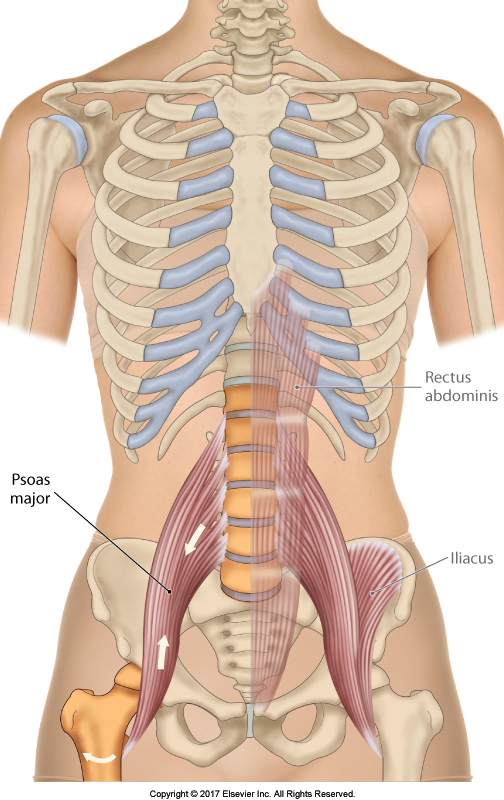This blog post contains the cited references for the eleven-part blog series on Psoas Major Function:

- Basmajian, J. V. & DeLuca, C. J. (1985). Muscles alive: Their functions revealed by electromyography (5th). Baltimore: Williams & Wilkins.
- Gibbons, S. (2007). Clinical anatomy and function of psoas major and deep sacral gluteus maximus. Published in Movement, stability & lumbopelvic pain: Integration of research and therapy (2 ed.). (Edited by Vleeming, A., Mooney, V., & Stoeckart, R.) Edinburgh: Churchill Livingstone of Elsevier.
- Hall, S. J. (2012). Basic biomechanics (6th). New York: McGraw Hill.
- Hamill, J. & Knutzen, K. M. (2003). Biomechanical basis of human movement (2nd). Baltimore: Lippincott Williams & Wilkins.
- Hamilton, N, Weimar, W. & Luttgens, K. (2012). Kinesiology: Scientific basis of human motion (12th). New York: McGraw Hill.
- Jenkins, D. B. (2002). Hollinshead’s Functional anatomy of the limbs and back 98th). Philadelphia: W. B. Saunders Company of Elsevier.
- Kapandji, I. A. (1974). The physiology of joints: Volume three: The trunk and the vertebral column. Edinburgh: Churchill Livingstone of Elsevier.
- Kendall, F. P., McCreary, E. K. & Provance, P. G. (1993). Muscles: Testing and function (4th). Baltimore: Williams & Wilkins.
- Levangie, P. K. & Norkin, C. C. (2011). Joint structure and function: A comprehensive analysis (5th). Philadelphia: F. A. Davis.
- Levangie, P. K. & Norkin, C. C. (2001). Joint structure and function: A comprehensive analysis (3rd). Philadelphia: F. A. Davis.
- Lewit, K. (2010). Manipulative therapy: Musculoskeletal medicine. Edinburgh: Churchill Livingstone or Elsevier.
- McGill, S. (2007). Low back disorders: Evidence-based prevention and rehabilitation. Champaign: Human Kinetics.
- McGinnis, P. M. (2005). Biomechanics of sport and exercise (2nd). Champaign: Human Kinetics.
- Muscolino, J. E. (2017). Kinesiology: The skeletal system and muscle function (3rd). St. Louis: Elsevier.
- Muscolino, J. E. (2017). The muscular system manual: The skeletal muscles of the human body (4th). St. Louis: Elsevier.
- Myers, T. W. (2009). Anatomy trains: Myofascial meridians for manual and movement therapists (2nd). Edinburgh: Churchill Livingstone of Elsevier.
- Myers, T. W. (1998). Poise: Psoas-Piriformis balance. Massage Magazine, March/April, 31-39. (Reprinted in Myers, T. W. (no year given) Body3: A therapist’s anatomy reader. Published by Tom Myers.
- Netter, F. H. (2003). Atlas of human anatomy (3rd). Teterboro: Icon Learning Systems.
- Neumann, D. A. (2010). Kinesiology of the musculoskeletal system: Foundations for rehabilitation (2nd). St. Louis: Mosby of Elsevier.
- Oatis, C. A. (2004). Kinesiology: The mechanics & pathomechanics of human movement. Baltimore: Williams & Wilkins.
- Osar, E. (2012). Corrective exercise solutions: To common hip and shoulder dysfunction. Chichester: Lotus Publishing.
- Paoletti, S. (2006). The fasciae: Anatomy, dysfunction & treatment. Seattle: Eastland Press.
- Park, R. J., Tsao, H., Cresswell, A. G. & Hodges, P.W. (2012). Changes in Regional Activity of the Psoas Major and Quadratus Lumborum With Voluntary Trunk and Hip Tasks and Different Spinal Curvatures in Sitting. J Orthop
Sports Phys Ther. Sep 5, 2012 (Epub ahead of print). - Park, R. J., Tsao, H., Cresswell, A. G. & Hodges, P. W. (2012). Differential activity of regions of the psoas major and quadratus lumborum during submaximal isometric trunk efforts. J Ortho Res, Feb;30(2), 311-318.
- Sahrmann, S. A. (2002). Diagnosis and treatment of movement impairment syndromes. St. Louis: Mosby.
- Sajko, S. & Stuber, K. (2009). Psoas major: A case report and review of its anatomy, biomechanics, and clinical implications. J Can Chiropr Assoc, 53(4), 311-318.
- Simons, D. G. & Travell, J. G. (1999). Travell & Simons’ Myofascial pain and dysfunction: The trigger point manual: The trigger point manual: Volume 1: Upper half of body (2nd). Baltimore: Williams & Wilkins.
- Smith, L. K., Weiss, E. L. & Lemkuhl, L. D. (1996). Brunnstrom’s Clinical kinesiology (5th). Philadelphia: F. A. Davis.
- Standring, S. (Editor) (2008). Gray’s Anatomy: The anatomical basis of clinical practice (40th). Edinburgh: Churchill Livingstone of Elsevier.
- Thieme (2005). Atlas of anatomy: General anatomy and musculoskeletal system. Stuttgart: Georg Thieme Verlag.
- Yoshio, M., Murakami, G. & Sato, T (2002). The function of the psoas major muscle: Passive kinetics and morphological studies using donated cadavers. Journal of Orthopedic Science 7:199-207.
The 11 articles in the series are:
- Introduction & Muscle Biomechanics
- Biomechanics of the Psoas Major (Overview)
- Psoas Major Hip Joint Actions – Sagittal Plane
- Psoas Major Hip Joint Actions – Frontal Plane
- Psoas Major Hip Joint Actions – Transverse Plane
- Psoas Major Spinal Joint Actions – Frontal and Transverse Planes
- Psoas Major Spinal Joint Actions – Sagittal Plane
- Stabilization of the Spine by the Psoas Major
- Psoas Major and the Sacroiliac Joint
- Psoas Major and Fascial Pulls
- Summary of Psoas Major Function & Further Research
- (References)
Note: This article is modified from an article originally published in the massage therapy journal (mtj): Psoas Major Function: A Biomechanical Examination of the Psoas Major. Spring 2013 issue.


